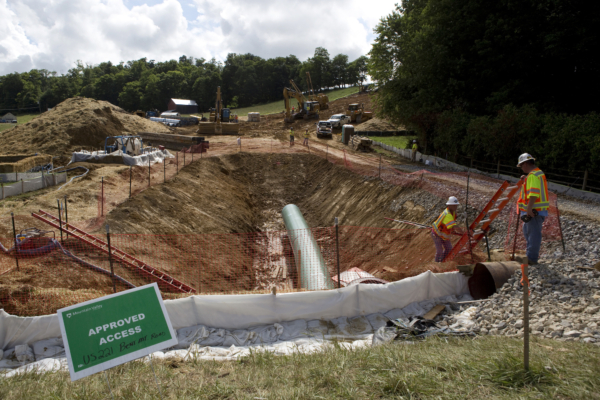The U.S. Supreme Court on Thursday allowed Equitrans Midstream Corp. to resume the building of the Mountain Valley Pipeline, granting what some described as a win for Sen. Joe Manchin (D-W. Va.) by lifting a lower-court order that blocked work on the project.
In a brief order (pdf), the high court suggested that it would possibly consider lawsuits issued by environmental groups. “Although the Court does not reach applicant’s suggestion that it treat the application as a petition for a writ of mandamus at this time, that determination is without prejudice to further consideration in light of subsequent developments,” it said.
“The application to vacate stays presented to The Chief Justice and by him referred to the Court is granted,” the Supreme Court added. It did not provide any explanation for why it decided to allow the firm to continue construction on the pipeline.
Thursday’s Supreme Court decision, meanwhile, was a loss for the Wilderness Society and other environmental groups that sought an injunction to halt construction. Those groups argued in court that the Mountain Valley Pipeline construction would negatively impact endangered species and said that the Forest Service and Bureau of Land Management violated environmental statutes by approving its construction.
Lawyers for the groups made reference to an 1871 Supreme Court ruling that found Congress can specify rules about how court cases should be heard and resolved. However, they claimed the high court cannot dictate how federal courts should rule, as that would be an unconstitutional intrusion into the separate powers of the judiciary and would allow Congress “to pick winners and losers” in litigation before the federal courts.
Lawyers for the pipeline company said they needed quick Supreme Court action to keep plans on track to finish building the 300-mile pipeline and put it into service by the winter when the need for natural gas for heating grows. Mountain Valley Pipeline said the work is largely complete, except for a 3-mile section that cuts through the Jefferson National Forest.

The $6.6 billion project is designed to meet growing energy demands in the South and Mid-Atlantic by transporting gas from the Marcellus and Utica fields in Pennsylvania and Ohio.
The project has been delayed due to a litany of court challenges. One challenge against the pipeline was upheld by the 4th Circuit of Appeals, which has often tossed out the pipeline’s permits over environmental concerns. The Supreme Court on Thursday ruled on two disputes, with one being brought by the Wilderness Society and the second having been brought by 10 environmental groups.
Those groups had wanted a review from the 4th Appeals Court of authorizations that were handed down earlier this year by the U.S. Fish and Wildlife Service, the Bureau of Land Management, and the U.S. Forest Service that allowed the pipeline segments in an aforementioned portion of the Jefferson National Forest.
Officials Respond
It also comes as Mr. Manchin and several other lawmakers added items into the debt ceiling bill passed last month that sought to allow the pipeline to continue.
“The Supreme Court has spoken and this decision to let construction of the Mountain Valley Pipeline move forward again is the correct one,” the West Virginia senator, who is up for reelection in 2024, said in a statement. “I am relieved that the highest court in the land has upheld the law Congress passed and the President signed.”
West Virginia Attorney General Patrick Morrisey, a Republican, similarly praised the decision by saying that he is “pleased the Supreme Court recognized the importance of this project not only for West Virginia, but for the nation.”
“The Mountain Valley Pipeline is vital to the survival of American energy independence and affects thousands of jobs in West Virginia—its completion is also critical to our national security, the urgent need is for it to be completed as soon as possible,” he added.
West Virginia Gov. Jim Justice spoke about the pipeline at a press briefing Wednesday, where he announced his filing of an Amicus Brief urging the Supreme Court to restart construction. Mr. Justice said the repercussions of stopping the pipeline would be “terrible” for the state for years to come.
Sen. Shelley Moore Capito (R-W. Va.) called the decision a “major win,” and added in a statement, “All necessary permits have been issued and approved, we passed bipartisan legislation in Congress, the president signed that legislation into law, and now the supreme court has spoken: construction on the Mountain Valley Pipeline can finally resume, which is a major win for American energy and American jobs.”
